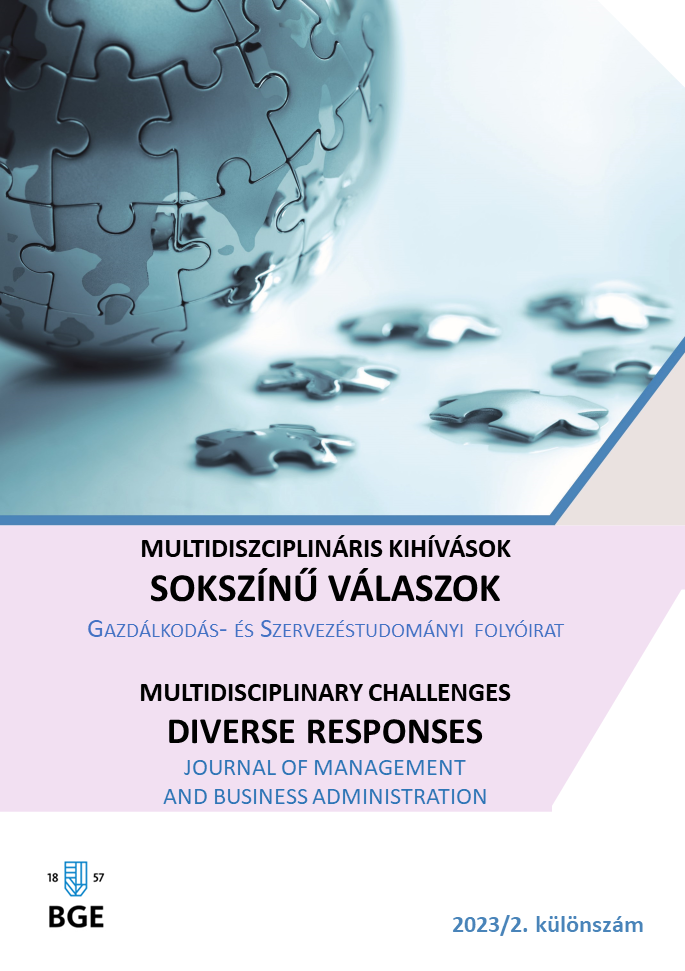A Study of Modern Tourism, How Social Media Influences Our Travels
Abstract
Modern technologies started out in manufacturing but have now become a driving force in many sectors, including tourism. The question of how modern-day tourism has changed in the wake of the pandemic, in the context of digitalisation, was thus raised as a research question. The general objective was to investigate the impact of the content seen on social media on the choice of travel destinations. As a specific objective, the most commonly used digital tourism applications are also presented. The survey was conducted through an online questionnaire, following the CAWI approach. The data received (N=180) were analysed using widely used tests (Khi2 and Kruskal-Wallis) and cross-tabulation. In terms of results, it can be said that nowadays, anyone who is present on various social networking sites can be subconsciously inspired through the many images and messages posted there. It is an interesting fact that more influential are the influencers on social media whose opinion matter to people. From a tourism marketing point of view, the various social networking sites and the opinion leaders or influencers have become important profiles. The results show that people who are present on social media are likely to be influenced in their tourism decisions by the content and impulses they see there. Overall, therefore, a collaboration with an influencer or the so-called "Instagram-compatible" layout and serving can provide newer and newer opportunities for a restaurant or tourist destination.
References
Abidin, C., 2016. Visibility labour: engaging with influencers’ fashion brands and #OOTD advertorial campaigns on Instagram. Media Int. Aus. 161, 86-100. https://doi.org/10.1177/1329878X16665177
Buhalis, D., & Amaranggana, A. 2013. Smart tourism destinations. In Information and Communication Technologies in Tourism 2014: Proceedings of the International Conference in Dublin, Ireland, January 21-24, 2014 (pp. 553-564). Springer International Publishing.
Bulchand-Gidumal, J. 2022. Post-COVID-19 recovery of island tourism using a smart tourism destination framework. Journal of Destination Marketing & Management, 23. https://doi.org/10.1016/j.jdmm.2022.100689
Csordás, T., Irimiás, A., & Kiss, K. 2022. Digitalizáció-vezérelt innovációk a turizmusban – fókuszban a fogyasztói magatartás. Turizmus Bulletin, 22(4), 16–25. https://doi.org/10.14267/TURBULL.2022v22n4.2
Cronjé, D. F., & du Plessis, E. 2020. A review on tourism destination competitiveness. Journal of Hospitality and Tourism Management, 45(6), 256-265. https://doi.org/10.1016/j.jhtm.2020.06.012
De Veirman, M., Hudders, L. & Nelson, M. R., 2019. What Is Influencer Marketing and How Does It Target Children? A Review and Direction for Future Research. Front. Psychol. 10:2685. https://doi.org/10.3389/fpsyg.2019.02685
El Archi, Y., Benbba, B., Nizamatdinova, Z., Issakov, Y., Vargáné, G. I. & Dávid, L. D., 2023. Systematic Literature Review Analysing Smart Tourism Destinations in Context of Sustainable Development: Current Applications and Future Directions. Sustainability, 15(6), 1-14. 5086. https://doi.org/10.3390/su15065086
Huzsvai, L. & Vincze, Sz. 2012. SPSS-könyv, Seneca Books. 333 p. ISBN: 978-963-08-5666-9
Instagram.com 2022. https://www.instagram.com Letöltve: 2022.október 20.
Iványi, T. 2022. Turisztikai információgyűjtés és élménymegosztás a közösségimédia korában. Turizmus Bulletin. 22(2). pp. 46–54. https://doi.org/10.14267/TURBULL.2022v22n2.5
Karami, A., Lundy, M., Webb, F. & Dwivedi, Y. K. 2020. Twitter and research: A systematic literature review through text mining, 8. https://doi.org/10.1109/ACCESS.2020.2983656
Katz, M. & Nandi, N. 2021. Social media and medical education in the context of the COVID-19 pandemic: scoping review. JMIR Medical Education, 7(2), 1-10. https://doi.org/10.2196/25892
Khan, M. L. 2017. Social media engagement: What motivates user participation and consumption on YouTube? In: Computers in human behavior, (66), 236-247. https://doi.org/10.1016/j.chb.2016.09.024
Klausz, M. 2016. A közösségi média nagykönyve (bővített kiadás) -Hogyan vidd sikerre a céged és önmagad. Athenaeum Kiadó, Budapest. pp. 111-198.
Lee, P. Y., Koseoglu, M. A., Qi, L., Liu, E. C. & King, B. 2021. The sway of influencer marketing: Evidence from a restaurant group. International Journal of Hospitality Management. 98(1) https://doi.org/10.1016/j.ijhm.2021.103022
Li, J., 2022. TikTok: A Must-Have App. In 2022 2nd International Conference on Enterprise Management and Economic Development, Atlantis Press. pp. 1015-1018. https://doi.org/10.2991/aebmr.k.220603.165
Mathew, P. V., & Sreejesh, S. 2017. Impact of responsible tourism on destination sustainability and quality of life of community in tourism destinations. Journal of Hospitality and Tourism management, 31, 83-89. https://doi.org/10.1016/j.jhtm.2016.10.001
Médiaköltések az offline és online médiatérben, 2023 https://nmhh.hu/cikk/235687/Mediakoltesek_az_offline_es_online_mediaterben Letöltve: 2023. augusztus 03.
Médiapiaci jelentés, 2021 https://nmhh.hu/dokumentum/234335/NMHH_mediapiaci_jelentes_2022.pdf Letöltve: 2023. augusztus 03.
Mele E., Kerkhof P. & Cantoni, L., 2021. Analyzing cultural tourism promotion on Instagram: a cross-cultural perspective. Journal of Travel & Tourism Marketing, 38(3), 326-340. https://doi.org/10.1080/10548408.2021.1906382
Naresh, K. M. & Simon, J., 2009. Marketingkutatás, Akadémiai Kiadó Zrt. Budapest, 832 p. https://doi.org/10.1556/9789630598675
Papp-Váry Á. F. 2020. Az influencer marketing alapjai-Gyakorlati áttekintés. http://www.papp-vary.hu/reklam_marketing/Az_influencer_marketing_alapjai_Gyakorlati_attekintes.pdf
Rimóczi, C., & Kozik, E., 2023. Influencerek hatása a Z-generáció fogyasztási szokásaira–feltáró kutatás. Jelenkori Társadalmi és Gazdasági Folyamatok, 18 (Különszám), 397-409. https://doi.org/10.14232/jtgf.2023.kulonszam.397-409
Shao G., 2009. Understanding the appeal of user‐generated media: a uses and gratification perspective. College of Communication and Information Sciences, University of Alabama, Tuscaloosa, Alabama, USA pp. 7-25. https://doi.org/10.1108/10662240910927795
Sheldon, P. & Bryant, K., 2016. Instagram: Motives for its use and relationship to narcissism and contextual age. / Computers in human Behavior, Department of Communication Arts, University of Alabama Huntsville, USA. (58), 89-97. https://doi.org/10.1016/j.chb.2015.12.059
Süli, D. & Martyin-Csamangó, Z., 2020. The impact of social media in travel decision-making process among the Y and Z generations of music festivals in Vojvodina and Hungary. Turizam, 24(2), 79–90. https://doi.org/10.5937/turizam%v-24678
Szakály, O. 2023. A gasztronómiai fogyasztók szegmentálása az online aktivitás és az influencerkövetés szemszögéből. Turizmus Bulletin, 23(1), 4-14. https://doi.org/10.14267/TURBULL.2023v23n1.1
Székely, L., 2012. Az új csendes generáció. Magyar Ifjúság, pp. 9-28.
UNWTO (United Nation World Tourism Organization) 2022. World Tourism Barometer 2022 may excerpt, Tourism recovery gains momentum as restrictions ease and confidence returns. https://webunwto.s3.eu-west-1.amazonaws.com/s3fs-public/2022-06/UNWTO_Barom22_02_May_excerpt.pdf?VersionId=5c9Q9abJCiFcJYyU_.4zmzilL3YBzI7A Letöltve: 2022. augusztus 22.
Whiting, A., Williams, D. L. & Hair, J., 2019. Praise or revenge: why do consumers post about organizations on social media. Qualitative Market Research: An International Journal. USA. 22(2), 130-160. https://doi.org/10.1108/QMR-06-2017-0101


























